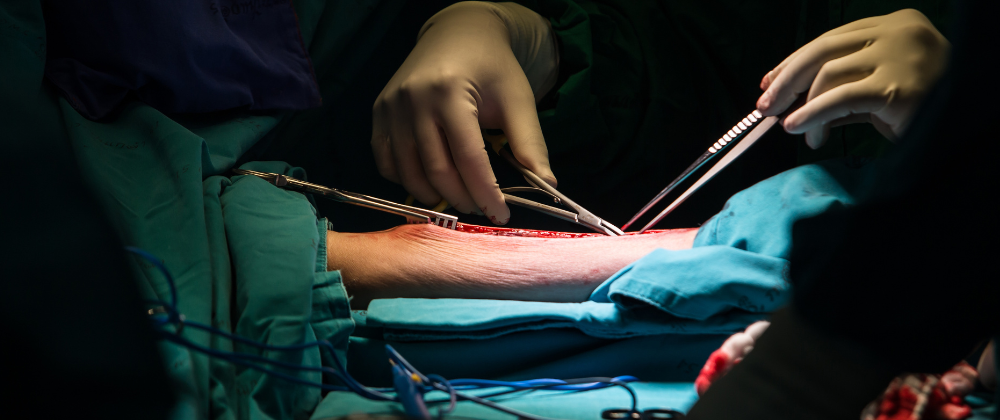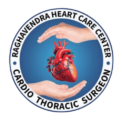Coronary Artery Bypass Graft
Appointment Form

Dr. Raghavendra Murthy
MBBS, MS - General Surgery, MCh - Cardio Thoracic and Vascular Surgeron

Best Coronary Artery Bypass Graft Surgery in Bangalore
Coronary Artery Bypass Graft (CABG) is a type of heart surgery where blood flow is rerouted around blocked arteries to restore normal circulation. During this surgery, a healthy artery or vein from another part of the body (often from the leg or chest) is used to bypass the blocked coronary artery. This allows blood to flow freely, ensuring that the heart muscle gets the oxygen it needs to function efficiently.
This procedure is often necessary for patients with severe heart disease when non-surgical treatments, such as medication or angioplasty, are no longer effective. CABG can improve symptoms such as chest pain and prevent life-threatening heart attacks.
What is Coronary Artery Bypass Graft (CABG)?
Coronary Artery Bypass Graft (CABG), commonly known as bypass surgery, is a life-saving procedure performed to restore blood flow to the heart. It is especially recommended when the coronary arteries are blocked or severely narrowed, making it difficult for the heart to receive the oxygen-rich blood it needs to function properly. In Bangalore, Coronary Artery Bypass Graft (CABG) is one of the most commonly performed procedures to treat heart blockages and improve cardiovascular health. If you’re exploring CABG in Bangalore, this article will explain the procedure, its benefits, risks, and why choosing an experienced surgeon like Dr. Raghavendra Murthy is essential for your heart health.
Indications for CABG
Doctors recommend Coronary Artery Bypass Graft (CABG) in several scenarios, including:
- Severe blockages in one or more of the coronary arteries
- Persistent chest pain (angina) that does not respond to other treatments
- Reduced heart function due to restricted blood flow
- High risk of heart attacks, as determined by medical tests
If you have been diagnosed with severe heart blockage, CABG may be the best option for long-term health and improved quality of life.
Benefits of CABG
The benefits of Coronary Artery Bypass Graft (CABG) surgery are significant for patients struggling with advanced coronary artery disease:
- Restores proper blood flow, improving overall heart function.
- Reduces the risk of a heart attack by addressing critical blockages.
- Eases symptoms like chest pain and shortness of breath
- Improves the patient's ability to perform daily activities without discomfort
- Offers long-lasting results, allowing patients to lead a healthier life
By undergoing bypass heart surgery in Bangalore, many patients have reported enhanced well-being and prolonged heart health.
Risks and Recovery
As with any major cardiac surgery, CABG carries certain risks, such as infection, blood clots, or complications related to anesthesia. However, with advancements in cardiothoracic surgery and the expertise of skilled surgeons like Dr. Raghavendra Murthy, the success rates of CABG in Bangalore are high.
Recovery from Coronary Artery Bypass Graft (CABG) takes time, usually 6 to 12 weeks. Patients are advised to follow a comprehensive care plan, including medications, dietary changes, and regular follow-ups with their cardiologist. Most patients gradually return to normal activities within a few months, with improved heart function and fewer symptoms of heart blockage.
Awareness of these potential complications highlights the importance of early detection and treatment of aortic aneurysms. For those diagnosed with this condition, seeking the Best Aortic Aneurysm Repair Surgery in Bangalore can help mitigate these risks and improve patient outcomes.
Treatment Options for Coronary Artery Bypass Graft (CABG)
Coronary Artery Bypass Graft (CABG) surgery is a pivotal procedure to improve blood flow to the heart by bypassing blocked arteries. This surgery, also known as heart bypass surgery, aims to restore heart health and alleviate symptoms of severe heart disease by treating blockages in coronary arteries. Here are the key treatment options and considerations for CABG:
This traditional approach involves a surgical incision to open the chest and connect a healthy artery or vein to bypass the blocked coronary artery. CABG in Bangalore offers top facilities for cardiac surgery with experienced surgeons specializing in heart disease treatment.
For eligible patients, minimally invasive options provide a less extensive alternative with smaller incisions, reduced recovery times, and minimized surgical risks, making it a suitable cardiac surgery for select heart disease patients.
Combining CABG with other cardiology procedures, such as angioplasty, hybrid approaches address multiple blockages through a tailored treatment plan. This can be beneficial for patients with complex or extensive coronary artery disease.
Following heart bypass surgery, patients require a structured rehabilitation plan, encompassing medication, diet, exercise, and regular monitoring to ensure heart health restoration and prevent future heart blockage.
In some cases, other options, such as stenting or angioplasty, may be recommended instead of CABG. Consulting with a cardiologist can help determine the most effective surgical cardiac care option based on individual health needs.
Coronary Artery Bypass Graft (CABG) remains a critical method in restoring healthy blood flow and managing heart blockage effectively. Each case is unique, and determining the best course of action depends on the severity of blockage and overall heart health. For those experiencing heart blockage, it’s essential to explore options to regain a healthy lifestyle.
Conclusion
Coronary Artery Bypass Graft (CABG) surgery offers a reliable pathway to improve heart function and overall quality of life for those facing severe coronary artery blockages. From traditional procedures to minimally invasive and hybrid options, CABG can be tailored to suit individual health needs and risks. For those suffering from heart disease symptoms, consulting a cardiac specialist to explore CABG and other heart blockage treatment options is essential for effective heart health restoration. Embracing the right treatment can lead to a healthier, more active life, reducing future heart complications and enhancing longevity.
Frequently Asked Questions
Candidates typically include patients with severe coronary artery disease, multiple artery blockages, or when other treatments like medication or stents are ineffective.
While angioplasty uses stents to open narrowed arteries, CABG creates a new path around blocked arteries, typically used when multiple arteries are affected.
CABG can take 3 to 6 hours, depending on the number of bypasses required and the complexity of the case.
CABG is highly effective, with most patients experiencing reduced symptoms, improved blood flow, and a lowered risk of future heart problems.
The surgeon will use a blood vessel graft, usually from the leg or chest, to bypass the blocked artery. The procedure may involve a heart-lung machine or be done off-pump.
Yes, patients typically take medications to manage blood pressure, cholesterol, and other factors to reduce the risk of new blockages.
